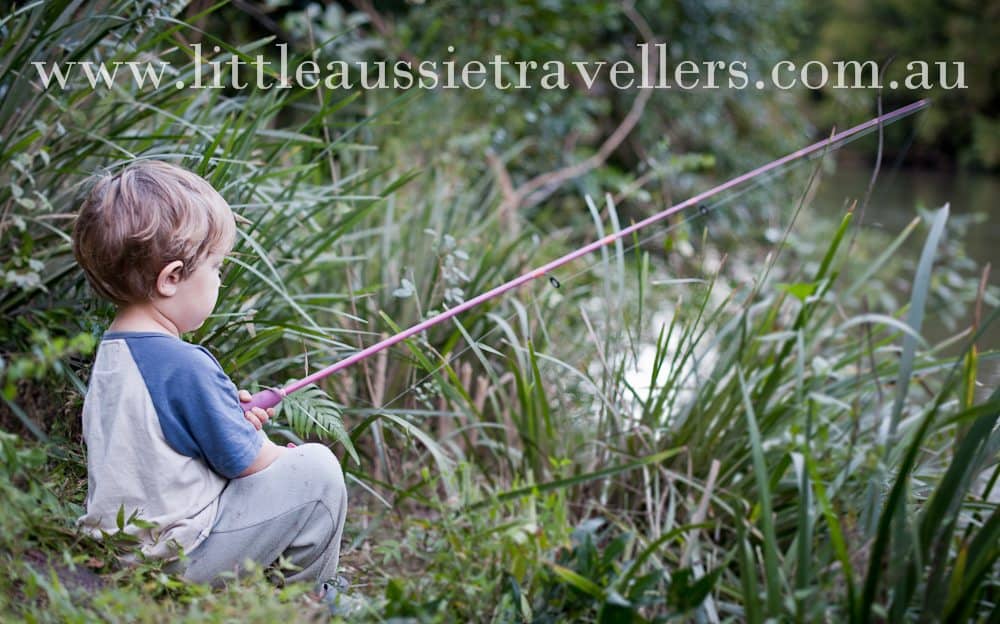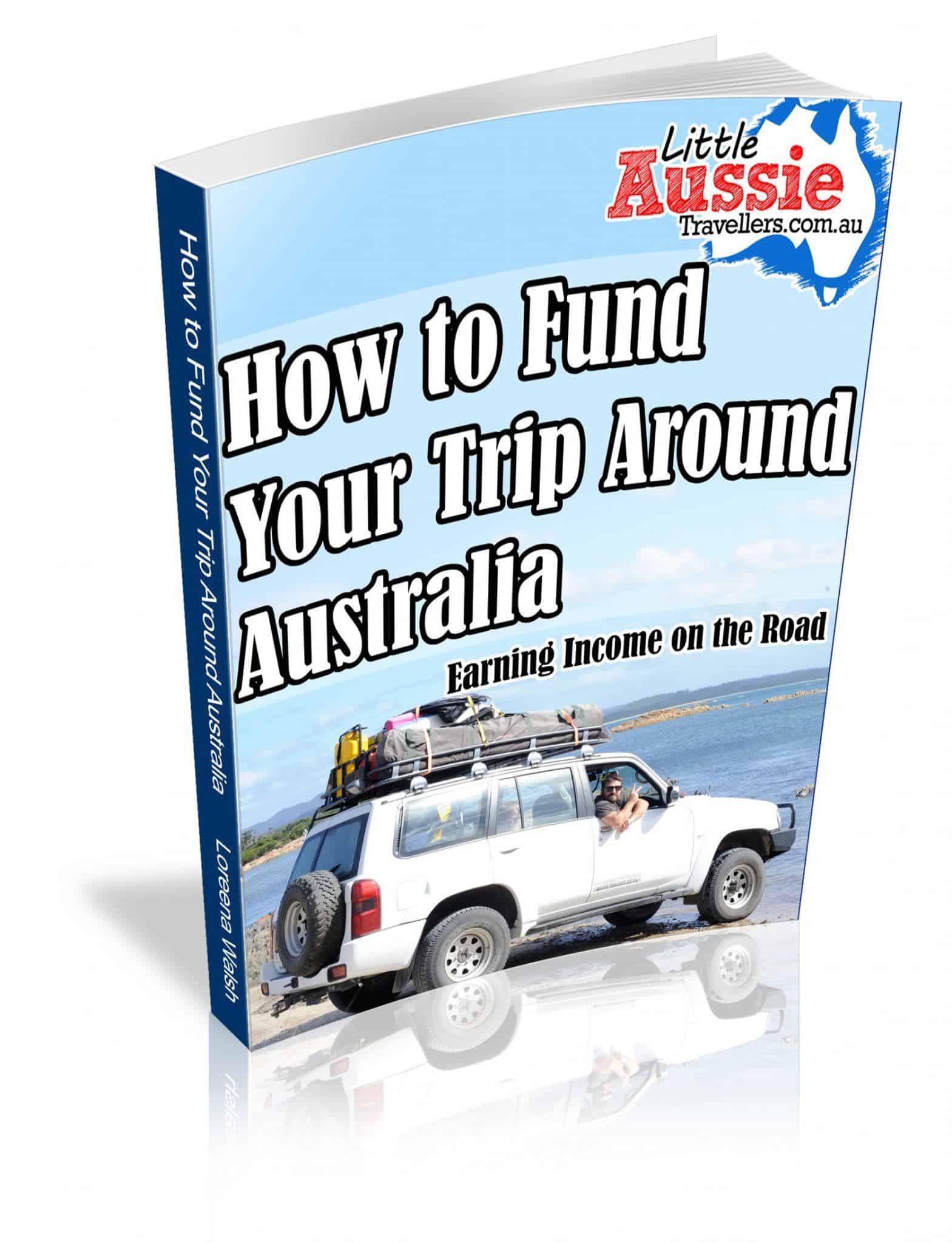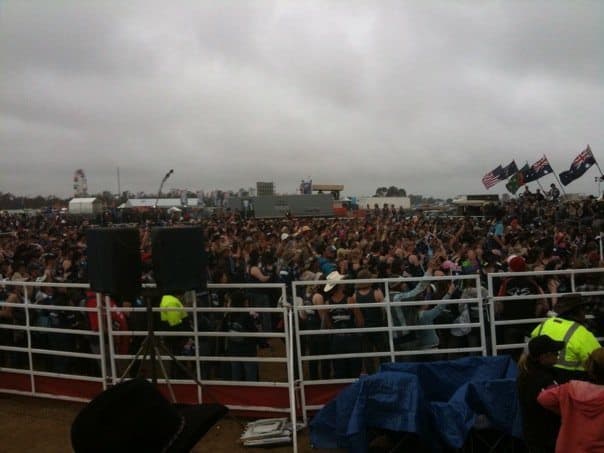
by Loreena Walsh | Family Travel
I’m not quite sure when I realised my parenting choices were starkly different to most of the other parents I knew.
A memorable one, that perhaps shows deeply our philosophies on family travel is where we had three weeks and $10,000 to spend on a holiday, and we were given the advice by most people we knew to go on a cruise, because “there’s always easily accessible childcare there so you can enjoy yourselves”. We both where aghast that people so readily wish to dump there kids for a holiday and could think of nothing worse, so we set off in a tent to explore from Darwin to Adelaide. The kids were 5, 3 and 18 months, we were covered in red dirt for almost the entire 3 weeks, and they probably don’t remember much of it, but we don’t regret that choice at all. I am still sure my spirit wouldn’t have been fulfilled on a cruise nearly as much as it was making those memories with our young family in some of the most breathtaking regions of Australia.
So, it probably came as no surprise to our friends, when we first dragged all three children along to a weekend music festival. In the rain.
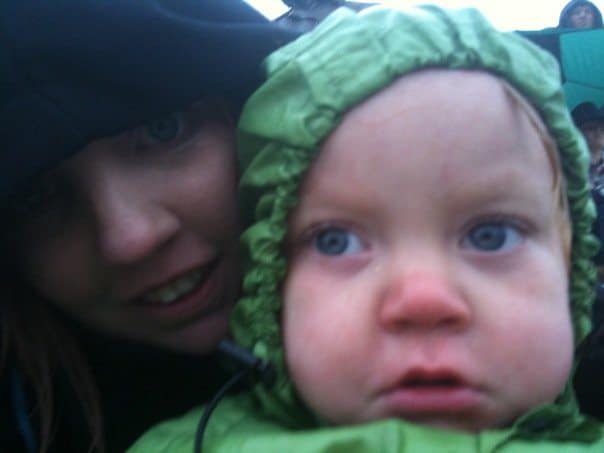
Rugged Up at Deni Ute Muster
Our introduction of live music to our children started quite early. Our eldest spent the night, right through until after midnight tucked snugly in his pram when we went to dinner as new parents, only to discover a wonderful singer, and not wanting to go home, figured as long as he was sleeping and happy, then there was no harm in staying to enjoy the tunes. In fact, all three children danced wildly in my belly at concerts, the first at riverdance when I was around 8 months, the second at dirty dancing the musical, and the third at a Robbie Williams concert. Their love of music was nurtured in the womb.
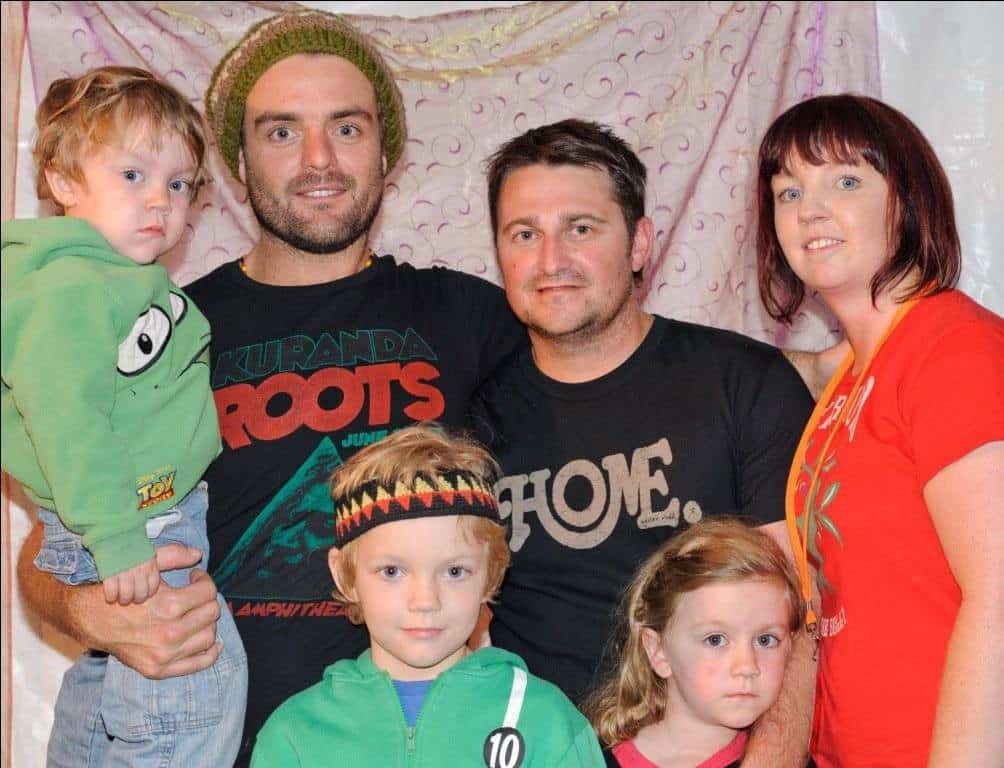
Hanging with Xavier Rudd at FOTSUN
I respect that for many people, taking their children to live music events isn’t something they’d feel comfortable doing, and that’s OK. Like with everything in parenting, the choice is an individual one. For those people who have considered it and just aren’t sure it would work, then we hope to inspire you to give it a go and hopefully you’ll have as much fun as we have over the years, and plan to have for many years to come, enjoying live talent with our kids. At Deni Ute Muster we got to take part in the Guinness Book of World Records Blue Singlet Record in 2009…. The crowd of 2010 currently hold the record and we’d love to get back there to give it another shot!
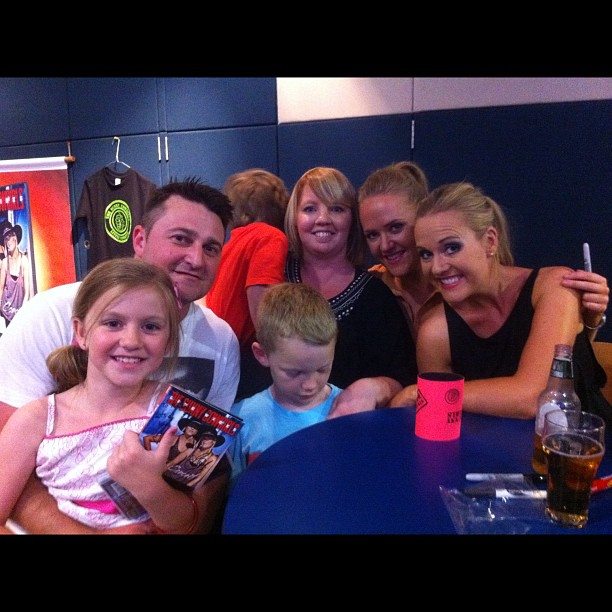
Meeting the Sunny Cowgirls
Key Points for Taking Children to Music Festivals.
- Dress Appropriately – Our weekend in the rain at FOTSUN meant ensuring the kids had great rain jackets, gumboots and plenty of changes of clothing for the guaranteed mud play. For sunny festivals, hats and sunscreen, and layered clothing works well if you’re not sure quite what the weather will do. DENI UTE MUSTER was freezing when we were there, and there were night concerts we wanted to see, so again, warm clothes, waterproof gear and plenty of layers were essential.
- Know the Food Rules – It’s a great idea to check before hand if you’re allowed to take food into a festival. Lots of places expect you to buy food while you’re there. Packing a couple of snacks probably isn’t going to get you in trouble, or if there’s certain things your children are fussy about, or have allergies etc, but don’t plan on packing eskies of food for venues that don’t allow it. Similarly, you’ll likely be able to take a drink bottle in for the kids, but some places don’t allow this either, so always check ticket conditions and FAQ on websites and pack accordingly.
- Don’t Expect to Re-live Your Youth – Yes, music festivals with your children are a great way to expose them to music culture, but don’t expect to be right up front of stage in all the action. Kids will get fussy, sooky, and all the other things kids do, so always do your best to find a comfortable vantage point that allows you to make easy escapes to toilets or to top up drinks and other requirements. Similarly if the kids become rowdy or boisterous, have some respect for fellow concert goers and move to another area where people won’t be inconvenienced.
- Stay in the Family Area – Festivals like FOTSUN and DENI UTE MUSTER offer family areas that restrict alcohol consumption and are made to provide a safer environment for people with children. It’s always a great idea to stay in these areas for overnight festivals where such a section is provided.
- Buy the Correct Tickets – Some festivals and concerts allow kids to enter free with paying adults, others have cheaper pricing for children, and others have age restrictions. If in doubt, always contact the promoter to be sure you won’t be disappointed and not allowed entry on the day.
Mostly, just get out there and enjoy the live music as a family.
During our travels across Australia, there are hundreds of music festivals we’ll be taking the kids to, everything from Jazz, Aboriginal Culture Festivals, to Gympie Muster and Blues Fest which I’ve somehow never quite made it to despite planning to go many years over. Our plans are to attend any festivals that are accessible to us, and to bring to you, how to head out there with your own kids and enjoy each one. We’ll be aiming for hints and tips specific to music festivals, and sharing our love of music within Australia.
As you all know, we’re very inspired by our love of Australia, so hopefully on the way we’ll get to ask some wonderful performers if anything in particular about Australia inspires them!
Have you taken your kids to music festivals? Got any advice to parents considering it? Anything you’d like to know or any festivals you’d like us to cover? Let us know in the comments below:

by Loreena Walsh | Thoughts & Ideas, Trip Planning
Tonight, the simple amount of $50.60 cents has changed our lives and sent us to a point of no return.
A simple ad that reads something like this:
MOVING SALE:
furn, tools,toys, camping,reptile, etc, 26&27Jan 8am
Just like that with a few strokes of the keypad, and an online payment and our lives are on sale!
I guess the most common question we get about selling up our lives to travel is “What will you do with all your stuff”?
Our answer is generally just a simple “We’re selling it all”. We’ve answered that question what feels like hundreds of times in the past year, and the answer seems so clear cut and simple.
There’s not much emotion behind it, and perhaps there’s even a relief in knowing that we’ll be rid of all the things that seem to weigh us down, and free to explore this amazing country and embrace our children as they grow so fast before our eyes. Other people seem so much more concerned with us selling everything than we are ourselves.
But now, it feels real.
Now, there’s no going back. On the 26th January, people are going to be knocking at our door, rummaging through our belongings and walking away with a part of our lives that we’ll never see again.
There’s something about this experience that’s leaving me feeling very vulnerable, but excited all at the same time.
Of course we’ll be keeping photographs and highly sentimental things that are impossible to replace, and my brother is storing those in plastic boxes in his garage. The rest, it will go.
If it doesn’t fit into our caravan or car for the trip, we just can’t keep it. It’s that simple.
I have to acknowledge that this will be somewhat difficult on us, and on the kids, as I’ve written before but I just know the result, and the life we’ll be living for the next couple of years is going to outweigh the vulnerability we’re all facing right now, I just know it!
We’ve already moved a load of things to my brother’s house. Mostly things he wanted, along with our boat and boat trailer, but this week, I’ll be sorting everything we own into boxes and piles of saleable items ready to say goodbye to this coming weekend!
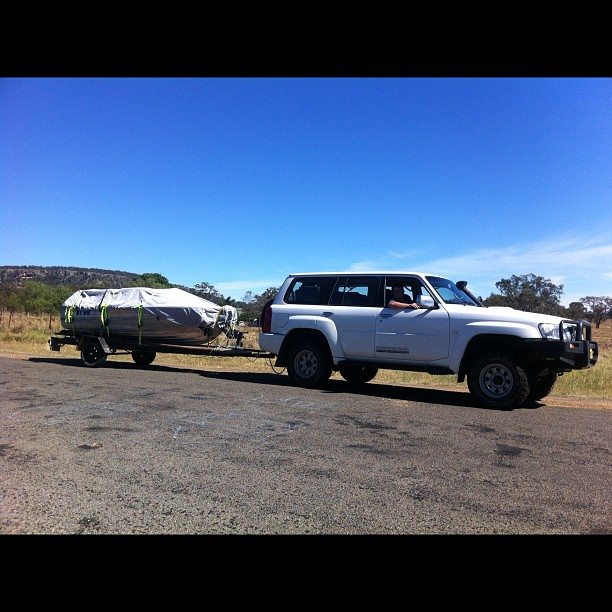
Moving a load of our stuff
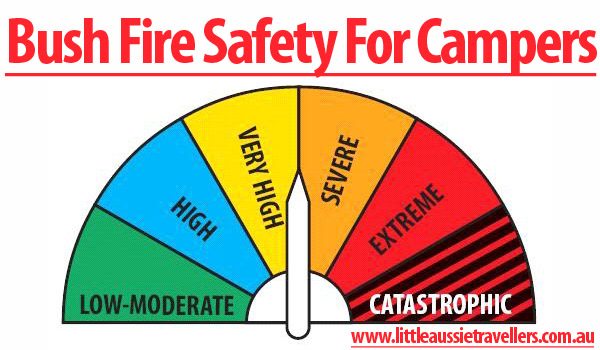
by Loreena Walsh | Camping, Slider Features
Australia has been in the grips of a heat wave in the past week or two with fire risk across the country. If you’re wanting to enjoy some family camping outdoors, then it’s super important that you understand the basics of bush fire safety for campers. With National Parks recently closed, and total fire bans across most of Australia, there have still been reports of travellers putting themselves in fire danger.
Camping during summer is great, but it’s important that you understand what to do if a fire threat occurs. It’s also important to know how to prevent starting an accidental fire at your campsite.
Bush Fire Safety Preparation For Campers
- Check for current fires: Using websites such as Landgate Fire Watch will help you track current fires burning in the areas you wish to camp in. They also list a range of other bushfire information services on their website below the current fire map.
- Be aware: While driving through the bush it pays to be aware of your surroundings. If you’re heading to a remote area or dry bush land and it’s a hot day, then the chances of a fire increase dramatically. Keep a look out for smoke, talk to rangers if you see them in camp areas or National Parks and check any signs that may reflect current fire danger risks.
- Carry suitable supplies: While singlets, shorts and swimmers are generally common camp gear, if you find yourself trapped in a bush fire area in the middle of summer, these clothing options will put your life in danger. Even in the hottest weather, you need to be prepared by carrying with you; long pants, a long sleeved shirt, hat and gloves made from natural fibres, along with glasses and boots. Wearing these items helps to protect your body from the deadly radiant heat that exists during a fire. Carrying a woollen blanket and plenty of water is also a great idea.
This may sound over the top, but the reality is, if you’re camping on hot days, in a region that has the possibility of being affected by fire, these items could save your life.
- Tell someone where you are going: If you’re heading off into bushland to camp, then let someone know exactly where you are going and for how long. In times of fire, communications can be cut from areas making it impossible for you to make contact in times of an emergency.
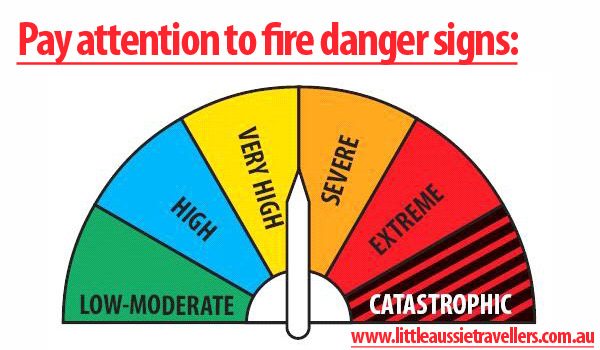
Basics of Bush Fire Safety For Campers.
- Is there a fire ban? It’s your responsibility when you’re camping to find out if there is a total fire ban in place. If there is, you will not be able to have a camp fire, or any naked flame. This needs to be taken very seriously, as it only takes one small mistake or disregard for the laws to cause major bush fires that threaten life and property. You can find fire ban details at the fire authority in your state.
- Preparing and lighting a camp fire: When you light your camp fire, make sure you do it in a cleared area or a dedicated fire pit. Do NOT place rocks around the edge of your camp fire as they can explode!
- Try to leave at least 3 metres between your fire and camp gear, and in a windy area try to keep the fire sheltered so not to blow embers onto bedding and supplies.
- Do not use liquid fuels such as fuel to start your fire. Use kindling and bunched paper instead.
- Safety Supplies: Have a fire extinguisher or water close by in case of emergency.
- Extinguish your camp fire correctly: Be sure to extinguish the fire correctly with water, ensuring that the entire fire is cool to the touch and well doused in water before you leave the area. It only takes a small amount of wind and a single ember to reignite a fire.
If You’re Caught In A Bush Fire While Camping
- Leave early: If the worst happens and you’re caught in a bushfire while camping, if it’s safe, the best thing you can do is leave early. If this means leaving some of your gear, and the fire is especially fierce, then just like people need to evacuate their homes, leaving gear behind could save your life. Stick to main roads and tracks to increase the chances you’ll be able to escape quickly and safely.
- Find a safe location: If you need to stay, then find a large open space, or already burned out area and stay there.
- Staying safe in your vehicle during a bush fire: If you need to stay in an area and fire is approaching and you’re in your vehicle, then park your vehicle off the road in a clearing as best you can. Turn your lights on, leave your engine running, if you can, make a clearing around the car, close all doors, windows and vents, get down as close to the floor as you can, and cover all exposed skin (preferably with a woolen blanket or natural fibre clothing). Drink plenty of water before the fire reaches your car, and stay down and under cover until the sounds of the fire have gone.
It is always safer not to be in a bush fire danger area, so travel smart and take care.

by Loreena Walsh | Camping
As a a family who’s always gone camping with kids, we often forget that for other families, camping isn’t their first choice of holiday, and perhaps they’ve never been camping before and aren’t sure where to start. It’s easy to overlook the basics of family camping, and we often get emails asking for advice, so here’s our rundown on getting started with camping with kids.
Why you should go camping as a family.
Budget, freedom, fun. Those 3 words describe the family camping experience perfectly. If you’ve never headed into the wilderness with your children, and are a bit worried about the logistics or doing things the right way, the first piece of advice is to relax. Half the fun of camping is that you get to leave the stress and worry behind and enjoy spending time with nature and with each other. 5 Reasons to go family camping:
- Time together
- Time with nature
- Freedom
- Exploring
- Inexpensive

What gear you need to go camping with kids.
Over the years we’ve collected all kinds of wonderful camping accessories to improve our camping experience, but I can honestly say that the best camping trips are often the most basic ones. The problem with collecting lots of gadgets to use and then dragging them all with you is that you have to unpack them all when you get home. It will take a bit of time to figure out what suits you as a family, so trial and error will occur, but it’s best to start basic with things that you really need, and then build up from there.
- Accommodation – Tent, Camper or Caravan etc
- Water – Take plenty of fresh water if you’re camping in National Parks or remotely without water supply
- Food – Easy food is a great idea, some snags for the bbq, plenty of snacks that keep well, like nuts. Fruit and drinks.
- Food Storage – You’ll need an esky or portable fridge to keep things cool, and plastic tubs work a treat to store food in and stop ants and wildlife getting to food.
- Cooking Gear – You’ll need a way to cook, either gas cooker or use of a fire if allowed are the usual choices.
- Supplies – Clothing, towels, a camp shower or bucket for bathing, first aid kit for camping, sunscreen, hats etc.
One thing is definitely DO NOT pack too many toys, they’ll just get in the way and be pushed aside most likely, or get lost and cause tears!
Where to go camping with kids.
If you’re struggling with the idea of camping remotely, then the first step is to head off to a caravan park, to experience the joys of camping with the conveniences you need still available to you. Choose somewhere a little special, preferably a park that allows you to be close to nature and have a great first run on “roughing it”. Once you’ve got your confidence and are feeling a bit more adventurous, try places like National Parks that often have toilets and (cold) showers and some facilities such as ice and firewood. You’ll still be camping in nature, but have the essentials you need. Over time you’ll figure out the best gear to suit your family and can adjust to suit your needs and experience.
What age to first go camping with kids?
We get this question a lot! The best answer I can give is any time! All of our kids went camping as small babies, were bathed in buckets, and crawled around in the bush eating grass and getting covered in dirt. That won’t suit everyone of course, but it’s definitely an experience! Of course, toddlers and preschoolers can be a little bit of hard work when camping as they’re eternally curious and have little sense of fear, so you’ll need to keep a close eye on them. We would often build temporary fences to keep our kids in the campsite when they were at difficult ages. Now, they are almost 6, 8 and 10 so they love the freedom and adventure of camping and are very easy going.
I hope that answers some of the questions we’ve received. If you have any more thoughts of questions, please don’t hesitate to drop us a line via email or in the comments below.
Happy Family Camping!
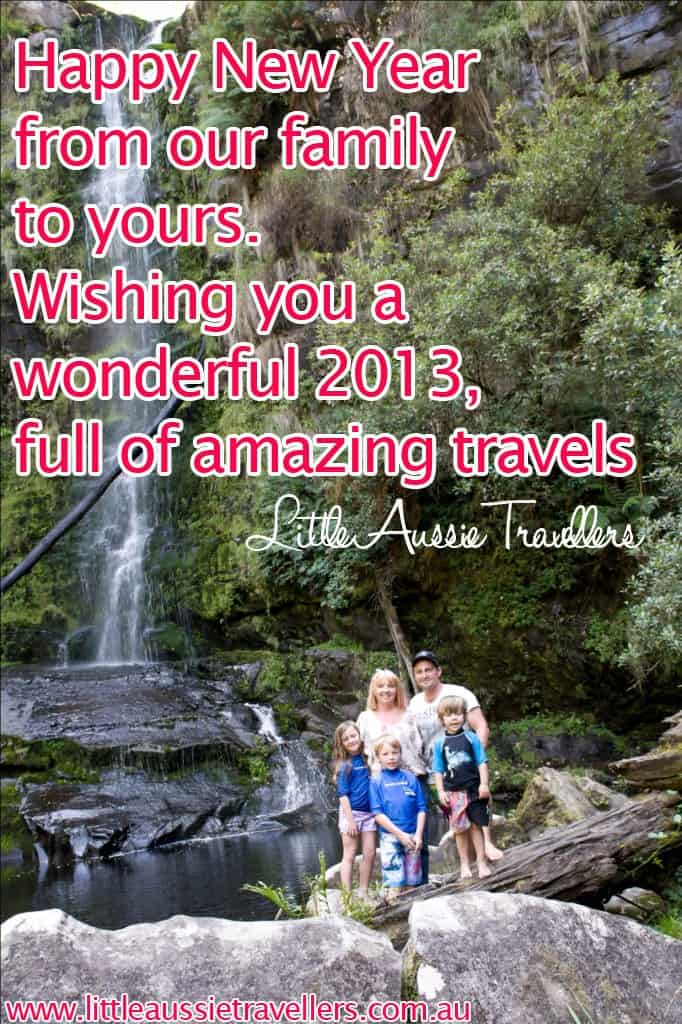
by Loreena Walsh | Thoughts & Ideas
Wishing you all a wonderful 2013 from our family to yours. May your 2013 be full of amazing family holidays!
We thank you so much for taking this journey with us and we are looking very, very forward to what 2013 has to offer. We look forward to sharing the New Year with you all xx


by Loreena Walsh | Gear Guide

So you’re heading off for a family holiday, the first thing you should pack is your family holiday first aid kit. While a basic first aid kit is fine, it’s much better if it contains things that are useful for your travel destination.
Whether your taking a road trip, going camping in a remote area, or spending your days lounging around a resort, there’s a chance you’ll need a first aid kit at least once during your travels. If you’re heading to remote areas or doing a lot of outdoor activities, not only is it essential to pack a well equipped first aid kit, it could save your life.
For families who do a lot of remote travel, it’s a great idea that one parent has a first aid certificate, or at least attends a first aid course to teach the basics. If that isn’t an option, then a good first aid guide that fits into your kit is a great option too.
What Basic Things Should A First Aid Kit Contain?
Every first aid kit should contain the following essential items:
- Band-aids
- Sterile gauze
- Saline (can be used to flush wounds or eyes etc)
- Insect repellent
- Burn cream
- Bite cream
- Scissors
- Safety pins
- Tweezers
- Sunscreen
- Paracetamol or Ibuprofen
- Sterile gauze
- Non adherent dressings
- A couple of bandages
- Notepad & pen/pencil
- Antiseptic wipes
- Gloves
- Paw paw cream
- Tea tree oil
- Resuscitation protective shield
For more remote travel you should also consider adding the following to your first aid kit:
- Emergency thermo blanket
- Cold packs or heat packs (instant type)
- Snake bite kit, containing compression bandages, a sharpie, gloves and a sling
- EPIRB in case of needing remote or urgent assistance
- A Satellite phone for remote/out of service travels
- Gauze swabs
- Thermometer
- Torch
- Senekot or similar
- Sudafed or similar
- Immodium or similar
- Menstruation pads/tampons
- Oil of cloves
Choosing A First Aid Kit
If you’re really wanting to have a specific kit with particular items, then designing and purchasing your own kit is definitely a great idea. Either that, or purchasing a ready made kit and adding your own touches to it could be less expensive and more thorough. Brands such as St Johns Ambulance or Red Cross offer thorough, high quality kits for sale. No matter which kit you purchase or how you put it together, it’s important that each time you head out (or if you’re on the road full time) that you check the expiry date of your first aid kit contents regularly or before you head away on holidays.
Do you have any tips, advice or preference when it comes to Family holiday First aid kit ideas for travellers? Let us know below in the comments…











